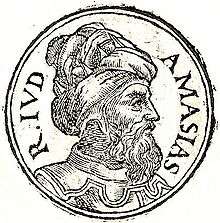Amaziah of Judah
| Amaziah | |
|---|---|
| King of Judah | |
 Amaziah from Guillaume Rouillé's Promptuarii Iconum Insigniorum, 1553 | |
| Reign | Over Judah (796–792 BCE) Entire reign (796–767 BCE) |
| Predecessor | Joash of Judah |
| Successor | Uzziah |
| Died | c. 767 BCE |
| Spouse | Jecoliah |
| House | House of David |
| Father | Jehoash of Judah |
| Mother | Jehoaddan (Hebrew: יהועדין or יְהוֹעַדָּן; Latin: Joadan) of Jerusalem |
| Rulers of Judah |
|---|
Amaziah of Judah, (pronounced /æməˈzaɪ.ə/, Hebrew: אֲמַצְיָהוּ, ʼĂmaṣyāhû, meaning "the strength of the Lord," "strengthened by Yahweh," or "Yahweh is mighty"; (Greek: αμασιας; Latin: Amasias)[1] was a king of Judah, the son and successor of Joash. His mother was Jehoaddan (2 Kings 14:1–4) and his son was Uzziah (2 Chronicles 26:1). He took the throne at the age of 25, after the assassination of his father, and reigned for 29 years, (2 Kings 14:2, 2 Chronicles 25:1) 24 years of which were with the co-regency of his son. The second Book of Kings and the second Book of Chronicles in the Hebrew Bible consider him a righteous king, but with some hesitation.[2] He is praised for killing the assassins of his father only and sparing their children, as dictated by the law of Moses.
Edwin R. Thiele dates his reign from 797/796 to 768/767 BCE.[3] Thiele's chronology has his son, Uzziah becoming co-regent with Amaziah in the fifth year of Amaziah's reign, in 792/791 BCE, when Uzziah was 16 years old.
Reign
As soon as his kingdom was established Amaziah executed the murderers of his father, but in obedience to the Mosaic laws permitted their children to live.[4]
Amaziah was the first to employ a mercenary army of 100,000 Israelite soldiers, which he did in his attempt to reconquer Edom, which had rebelled during the reign of Jehoram, his great-grandfather. He was commanded by an unnamed prophet to send back the mercenaries, to whom he acquiesced (2 Chronicles 25:7–10, 13), much to the annoyance of the mercenaries. His obedience to this command was followed by a decisive victory over the Edomites. (2 Chronicles 25:14–16)
Amaziah began to worship some of the idols he took from the Edomites. An unnamed prophet rebuked him for this and the king responded by threatening him that if he will continue to admonish he will strike him. His victory over Edom inflated his pride, and he challenged to a combat Jehoash, grandson of Jehu, king of Israel. The latter's disdain and scorn for Amaziah are embodied in the stinging parable of the thistle and the cedar (2 Kings 14:9). In his resentment, Amaziah rushed into a disastrous battle at Beth-shemesh, and a humiliating defeat overtook his army and the land. The king was captured, 400 cubits of the wall of Jerusalem broken down, the city, Temple, and palace were looted, and hostages carried to Samaria.[4] This is all considered in the Hebrew Bible as a punishment for turning away from God.
His defeat was followed by a conspiracy that took his life. He, like his father, was the victim of assassins, apparently bent upon putting out of the way one who had brought upon the land such dire disasters.[4] Amaziah was slain at Lachish, to which he had fled, and his body was brought to Jerusalem, where it was buried in the royal sepulchre (2 Kings 14:19–20; 2 Chronicles 25:27–28).
Biblical evaluation
According to the Books of Kings, Amaziah "did what was right in the sight of the Lord", but did not meet the standard of righteousness set by King David;[5] in particular, because he did not remove the local shrines on the "high places" and centralise worship in Jerusalem. The writer of the Books of Chronicles also considers that "he did what was right in the sight of the Lord, but not with a loyal heart".[6]
Chronological notes
The calendars for reckoning the years of kings in Judah and Israel were offset by six months, that of Judah starting in Tishri (in the fall) and that of Israel in Nisan (in the spring). Cross-synchronizations between the two kingdoms therefore often allow narrowing of the beginning and/or ending dates of a king to within a six-month range. For Amaziah, the Scriptural data allow the narrowing of his accession to some time between Nisan 1 of 796 BCE and the day before Tishri 1 of the same BCE year. For calculation purposes, this should be taken as the Judean year beginning in Tishri of 797/796 BC, or more simply 797 BCE. His death occurred at some time between Nisan 1 and Tishri 1 of 767 BCE, i.e. in 768/767 by Judean reckoning, or more simply 768 BCE.
Geographical note
See also
References
- ↑ "1 Chronicles 3:1 Amaziah his son, Azariah his son, Jotham his son". Mlbible.com. Retrieved 2012-10-01.
- ↑ 2 Kings 14:3;2 Chronicles 25:2
- ↑ Edwin R. Thiele, The Mysterious Numbers of the Hebrew Kings (3rd ed.; Grand Rapids, MI: Zondervan/Kregel, 1983) 217.
- 1 2 3 "Amaziah", Jewish Encyclopedia
- ↑ 2 Kings 14:3
- ↑ 2 Chronicles 25:2
![]()
Amaziah of Judah Cadet branch of the Tribe of Judah | ||
| Regnal titles | ||
|---|---|---|
| Preceded by Jehoash |
King of Judah 797–768 BCE |
Succeeded by Uzziah |